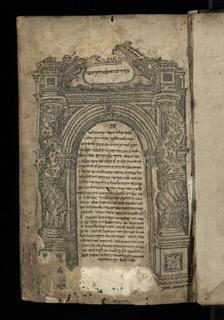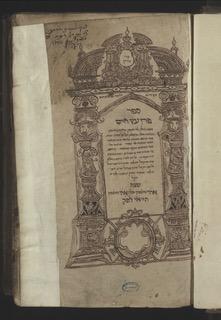Communicating Lurianic Knowledge in East-Central Europe and the Ottoman Empire
MS Wallach 561
Image Credit: Photo credit: National Library of Israel
NLI MS 4 6720
Image Credit: Photo credit: National Library of Israel
Avinoam J. Stillman
Communicating Lurianic Knowledge in East-Central Europe and the Ottoman Empire explores the circulation and development of Lurianic kabbalah in the seventeenth century in light of the life of Meir Poppers (d. 1662), a kabbalist who traveled between Krakow and Jerusalem. By tracing Poppers’ biography and literary output in his local and global contexts, a fuller picture of the history of early modern kabbalah in East-Central Europe and the Ottoman Empire emerges. Poppers’ lifetime spanned a crucial interval in the history of Lurianic kabbalah, beginning shortly after the death of Hayyim Vital and Isaac Luria’s other students around 1620, and concluding shortly before the messianic fervor surrounding Sabbatai Sevi in 1665. His life and his work are an essential – and hitherto untold – part of the story of early modern kabbalah and Jewish intellectual life at large.
Born to a wealthy family in Krakow in 1624, Meir Poppers moved to Jerusalem around the age of thirteen, inspired by his curiosity about Lurianic kabbalah, which was still relatively inaccessible outside of Erets Yisrael. There, he studied with influential Lurianic kabbalists such as Jacob Zemah and encountered the writings of Isaac Luria’s principle disciple, Hayyim Vital. Over the course of several years, Poppers edited several different recensions of Vital’s writings, producing what became the authoritative anthologies of Lurianic kabbalah: Derekh Ets Hayyim, Pri Ets Hayyim, and Nof Ets Hayyim. When Poppers left Jerusalem and returned to Poland around 1649, he brought these manuscripts with him. His journey to East-Central Europe, and the students he instructed there, contributed significantly to the circulation of Vital’s version of Lurianic kabbalah in Europe. Over the remainder of the 17th and 18th centuries, Poppers’ anthologies were copied and reworked in myriad manuscripts, garnering significant marginal notations and commentarial traditions. Poppers eventually returned to Jerusalem, where he continued to write kabbalistic commentaries, pedagogical texts, and homiletical compositions up until his death in 1662. Poppers’ historical significance lies in his association with both Ashkenazic and Sefardic cultures, his role as a devoted conduit for the transmission of earlier Lurianic texts, and his own independent-minded and prolific kabbalistic scholarship.
Within the framework of Poppers’ biography, this research project will draw on different theoretical and methodological approaches. It will emphasize the social networks within which historical agents cultivated kabbalistic knowledge, and the forms of discourse which reflect its dynamic status. Particular attention will be paid to the geographically and culturally specific characteristics of Lurianic kabbalah. The research project will be anchored in philological, paleographic, and bibliographical analyses which consider the materiality of text-editing and the production of manuscripts and printed books. Overall, the project will contribute to a deeper appreciation of the emergence of Lurianic kabbalah in the early modern period as a body of theoretical knowledge, a set of ritual and ethical practices, and an esoteric corpus of scholarly texts.



